Distinguished Research Professors
The title of Distinguished Research Professor recognizes senior faculty members who are internationally recognized for their innovative body of work and its transformational impact on the field. The Professorship is awarded to individuals working at the very top of their discipline, who are recognized as preeminent leaders in their fields of study.

Sonia Altizer, Martha Odum Distinguished Professor in the Odum School of Ecology, is a global leader in infectious disease ecology. Her research explores how host behavior, environmental change and migration patterns shape pathogen dynamics in wildlife populations. She is best known for pioneering work on monarch butterflies, demonstrating how long-distance migration reduces infection risk through migratory escape and culling, reshaping ecological understanding of host-pathogen interactions. Altizer’s interdisciplinary approach integrates field studies, citizen science and mathematical modeling, revealing how climate change, resource provisioning and habitat fragmentation influence disease spread. With more than 120 peer-reviewed publications, including in top scientific journals Science and Nature, her research has been cited more than 22,000 times. She has received funding for her research since 2002 and secured more than $7 million in grants. A Fellow of the Ecological Society of America and American Association for the Advancement of Science, Altizer has also served as interim dean and leads impactful outreach through Project Monarch Health, engaging volunteers in large-scale disease monitoring.

Luis Correa-Díaz, professor of Spanish in the Franklin College Department of Romance Languages, is a pioneering scholar and poet whose work has transformed Latin American literary studies, digital humanities and cultural theory. His research bridges classical and contemporary literature, with groundbreaking contributions to the study of digital poetics and artificial intelligence in literature. His monograph “Novissima Verba” and co-edited volume “Latin America Digital Poetics” explore how digital technologies and artificial intelligence are reshaping literary production and interpretation. Elected to the Academia Chilena de la Lengua and Spain’s Real Academia de Córdoba, Correa-Díaz is internationally recognized for his scholarship on Cervantes, Ercilla, Latin American poetry and literature’s role in human rights discourse. He has authored more than 20 poetry collections, 12 scholarly books and numerous journal articles, influencing generations of students and scholars worldwide. His interdisciplinary and multilingual research continues to push the boundaries of literary studies in the digital age.

Natarajan Kannan, professor in the Institute of Bioinformatics and the Franklin College Department of Biochemistry and Molecular Biology, is a leader in molecular evolution, computational biology and protein bioinformatics. His research has transformed the understanding of how complex signaling systems evolve at the molecular level. By combining computational and experimental approaches, he has mapped the origin and evolution of biomedically important signaling proteins such as protein kinases and glycosyltransferases, uncovering novel regulatory mechanisms and therapeutic targets. Kannan is a Georgia Cancer Coalition Scholar, and his work has led to more than 100 peer-reviewed publications, including top scientific journals such as Nature Communications, PNAS and Science Signaling, and has been cited more than 8,000 times. His $10 million in research funding includes major grants from NIH, NSF and the American Cancer Society. He has also developed open-source bioinformatics tools widely used by the scientific community. Kannan’s interdisciplinary research continues to shape biomedical sciences and advance innovations in computational and AI/ML technologies.

Barbara McCaskill, professor in the Franklin College Department of English and associate academic director of the Willson Center for Humanities and Arts, is a leading scholar of African American literature whose work has reshaped understanding of Black literary history and public humanities. Her research has been pivotal in recovering the lives and writings of historical Black figures, particularly William and Ellen Craft, whose daring escape from slavery in Georgia she examined in “Love, Liberation, and Escaping Slavery” and her critical edition of “Running a Thousand Miles for Freedom.” McCaskill has secured more than $2 million in external funding, co-leads the Willson Center’s Mellon Foundation-funded project “Culture and Community at the Penn Center National Historic Landmark District” and developed public-facing resources such as the award-winning Civil Rights Digital Library. Her research has been featured in high-impact journals, podcasts and national media. Through her scholarship and public engagement, she continues to illuminate African American literary and historical legacies.
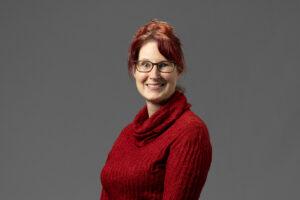
Christine Szymanski, professor in the Complex Carbohydrate Research Center and the Franklin College Department of Microbiology, is a leading expert in microbial glycobiology. Her research has transformed understanding of how bacterial glycosylation influences microbial pathogenesis, host interactions and vaccine development. She was the first to demonstrate that bacteria can modify proteins with N-linked glycans, a discovery that reshaped the field of bacterial glycobiology and paved the way for novel therapeutic strategies. Szymanski has authored 130 peer-reviewed publications, holds 13 patents and has secured or helped secure tens of millions of dollars in research funding from NIH, NSF and industrial collaborations. Her translational work has led to two biotech spin-offs focused on glycoconjugate vaccine development, attracting global interest in combatting diarrheal diseases and antimicrobial resistance. A Fellow of the American Academy of Microbiology and the National Academy of Inventors, Szymanski’s pioneering research continues to advance vaccine innovation and microbial pathogenesis.
Creative Research Medals
The university established the Creative Research Medals in 1980 to recognize a distinct and exceptional research or creative project, performed by a mid-career faculty member, with extraordinary impact and significance to the field of study.

Elizabeth Brisbois, associate professor and Distinguished Faculty Fellow in the College of Engineering, is being recognized for her pioneering work on light-based nitric oxide (NO) release technology for medical devices. Her research team developed a wearable fiber optic device that uses photoactive NO donor chemistry to deliver controlled antimicrobial NO therapy. This breakthrough has significant potential to prevent infections in catheters and wound dressings, addressing a major clinical challenge in health care by reducing complications and improving patient outcomes. Her findings, featured on the cover of the Journal of Controlled Release, led to a $2 million NIH R01 grant to further develop and advance to preclinical testing. Brisbois has secured more than $12 million in research funding, has more than 20 issued or pending patents, and co-founded Nytricx Inc. to commercialize biomedical technologies. A Senior Member of the National Academy of Inventors, she has also received multiple national awards recognizing her impact on biomaterials research and translational medicine.

Krista Capps, associate professor in the Odum School of Ecology and the Savannah River Ecology Laboratory, has led groundbreaking research on global carbon cycling in rivers. As part of a landmark study published in Science, Capps and colleagues conducted an experiment across 514 streams on six continents to measure organic matter decomposition. The team used a standardized assay to assess microbial activity, generating the first global-scale model of riverine carbon breakdown and identifying key environmental drivers. This research showed that accelerated decomposition rates were linked to regions dominated by human activities, such as urbanization and agriculture, potentially altering aquatic food webs and increasing carbon release into the atmosphere. Capps and co-authors used machine learning to develop a model explaining 70% of the variance in prior decomposition rates and created a predictive tool for environmental forecasting. A recipient of the NSF CAREER Award, she continues to advance freshwater ecology with globally impactful research on ecosystem resilience.

Justin Lavner, professor in the Franklin College Department of Psychology, led a landmark randomized controlled trial investigating the impact of a responsive parenting intervention on health outcomes among first-time Black mothers and their infants. The study, conducted in collaboration with UGA’s Center for Family Research and Augusta University Medical Center, examined how structured home visits in the early postpartum period influenced infant sleep, maternal well-being and child health. Lavner’s findings, published in JAMA Network Open and other high-impact journals, demonstrated that the intervention increased infants’ nighttime sleep by 40 minutes and 24-hour sleep duration by 73 minutes — critical improvements given longstanding sleep disparities. Additional research linked the intervention to healthier infant weight trajectories, enhanced maternal sleep and reduced maternal depressive symptoms. Lavner has helped secure more than $12 million in grant funding and published nearly 100 peer-reviewed articles. His work highlights the importance of culturally tailored parenting interventions in addressing health inequities and promoting family well-being.

Rumya Putcha, associate professor in the Hugh Hodgson School of Music and the Institute for Women’s and Gender Studies, explores the cultural politics of Indian dance in transnational contexts. Her book, “The Dancer’s Voice: Performance and Womanhood in Transnational India” (Duke University Press, 2023), examines how South Indian classical dance shapes narratives of caste, race and migration. Combining ethnographic research and historical analysis, Putcha demonstrates how the figure of the Indian dancing woman reinforces social hierarchies while also serving as a site of resistance. The book has received widespread acclaim for its interdisciplinary approach, engaging ethnomusicology, performance studies and postcolonial theory. Recognized with the 2024 de la Torre Bueno First Book Award from the Dance Studies Association and the 2025 Bernard S. Cohn First Book Award from the Association for Asian Studies, it has been reviewed in leading academic journals. Through this work, Putcha offers a critical rethinking of how performers cultivate citizenship in India and its diasporas.

Timothy Yang, associate professor in the Franklin College Department of History, explores the intersection of business, medicine and empire in the making of modern East Asia and Japan. His book, “A Medicated Empire: The Pharmaceutical Industry and Modern Japan” (Cornell University Press, 2021), is a micro-history of how a multi-national drug company, Hoshi Pharmaceuticals, expanded alongside Japan’s imperial ambitions, using state connections to dominate colonial markets. Through extensive archival research, Yang reveals how the company capitalized on imperial policies, marketing medicines in colonies while adhering to domestic narcotic bans, shaping both commercial and medical landscapes across the world. Widely praised for its innovative approach, the book won the Hagley Book Prize for best book in business history and has received glowing reviews in leading academic journals. Yang’s work bridges the history of science, economic history and colonial studies. As director of UGA’s Center for Asian Studies, he continues to advance interdisciplinary scholarship across Asia and beyond.
Creative Research Awards
These awards recognize established investigators whose overall scholarly body of work has had a major impact on the field of study and has established the investigator’s international reputation as a leader in the field.

Lamar Dodd Creative Research Award: Scott Merkle, professor of forest biology in the Warnell School of Forestry and Natural Resources, is a leading researcher in forest tree biotechnology. A major focus of his work has been the conservation and restoration of the American chestnut, a once-dominant species nearly eradicated by chestnut blight. His lab was the first to develop a somatic embryogenesis system for the species, enabling large-scale propagation and genetic transformation efforts aimed at producing blight-resistant trees. His work has supported broader restoration initiatives, including collaborations with The American Chestnut Foundation and the Forest Health Initiative. Merkle has applied similar biotechnological approaches to other threatened species, such as hemlocks and ash trees, and has contributed to phytoremediation research using genetically engineered trees to detoxify contaminated soils. His extensive research, spanning
in vitro propagation, conservation and genetic engineering, continues to inform efforts in forestry and environmental restoration.
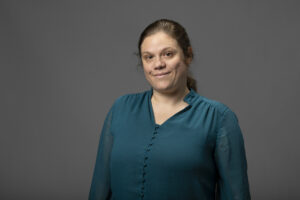
Albert Christ-Janer Creative Research Award: Rielle Navitski, associate professor in the Franklin College Department of Theatre and Film Studies, is a leading scholar in Latin American film and media studies. Her research explores the intersections of cinema and transnational exchange, challenging conventional narratives in film history. She has authored two influential monographs: “Public Spectacles of Violence,” which examines sensational cinema and journalism in early 20th-century Mexico and Brazil, and “Transatlantic Cinephilia,” which investigates networks of film culture between Latin America and France during the mid-20th century. Navitski’s scholarship, based on extensive archival research across multiple countries, has reshaped understandings of Latin American film’s role in global media history. She has also co-edited an open-access textbook on Latinx media and an anthology titled “Cosmopolitan Film Cultures in Latin America, 1896-1960.” Recognized with prestigious fellowships and awards, Navitski’s work continues to advance the fields of film history, cultural studies and Latin American studies, making a lasting impact on the discipline.

Lamar Dodd Creative Research Award: Pejman Rohani, Regents’ Professor and UGA Athletic Association Professor in Ecology and Infectious Diseases in the Odum School of Ecology and College of Veterinary Medicine, studies the ecology of infectious diseases. Since joining UGA in 2015, he has established an internationally recognized body of work focused on population dynamics, host-pathogen interactions and the mathematical modeling of diseases. His research has provided critical insights into disease transmission, vaccination strategies and epidemic forecasting, influencing global public health policy. Rohani serves as deputy director of the Center for Influenza Disease and Emergence Research (CIDER), a National Institutes of Health-funded initiative advancing the understanding of influenza and emerging pathogens. He has authored more than 160 peer-reviewed publications and co-authored a widely cited book on infectious disease modeling. A Fellow of the American Association for the Advancement of Science and the Ecological Society of America, Rohani’s expertise has been sought by the World Health Organization and the Institute of Medicine.

Lamar Dodd Creative Research Award: WenZhan Song, the Georgia Power Mickey A. Brown Professor in the College of Engineering, is a leading researcher in sensor networks, cyber-physical systems and security. His work integrates artificial intelligence and the Internet of Things (IoT) to enhance infrastructure security, energy resilience and health care technologies. He has pioneered breakthrough IoT innovations that enable real-time, non-intrusive health and activity monitoring for humans, animals, machines and infrastructures. His research in cyber-physical security has led to advanced systems that fuse cyber and physical signals to detect and mitigate threats to smart grids and industrial systems. He has also developed zero-trust IoT data infrastructure to ensure secure, reliable and privacy-preserving data storage and sharing. Many of his smart IoT technologies have been adopted in real-world settings. As director of UGA’s Center for Cyber-Physical Systems, he leads interdisciplinary initiatives that drive innovation and industry partnerships. His contributions have earned him numerous accolades, including the IEEE Mark Weiser Award.

William A. Owens Creative Research Award: Gregory Strauss, Franklin Professor of Psychology in the Franklin College Department of Psychology, is an internationally recognized leader in schizophrenia research, specializing in the study of negative symptoms — deficits in motivation, pleasure and social engagement that significantly impact quality of life. His work has reshaped the conceptualization, measurement and treatment of these symptoms, establishing him as a major force in the field. Strauss directs the Clinical Affective Neuroscience (CAN) Laboratory and the Georgia Psychiatric Risk Evaluation Program (G-PREP), where his team develops innovative assessment tools and targeted interventions for individuals at risk for psychotic disorders. His research has been cited more than 13,000 times, and he has secured more than $85 million in grant funding. With more than 230 publications, numerous invited talks and high-impact awards — including the Rising Star Award from the Schizophrenia International Research Society — Strauss continues to advance the understanding and treatment of schizophrenia’s most challenging symptoms.
Early Career Scholar Awards
Established by the UGA Research Foundation, these awards recognize junior faculty whose research, creative and scholarly achievements indicate a trajectory toward an exceptional, sustained research career and an imminent rise to international stature in their field of study.
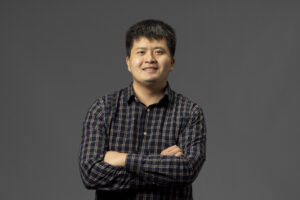
Charles B. Knapp ECS Award: Yilang Peng, assistant professor in the College of Family and Consumer Sciences’ financial planning, housing and consumer economics department, is a rising leader in computational social science, investigating how digital technologies shape consumer behavior, strategic communication and the spread of misinformation. His research integrates computer vision, machine learning and social science methodologies to analyze visual misinformation and its impact on public perception. His work has appeared in top-tier journals such as Journal of Communication, Political Communication and New Media & Society, earning more than 820 citations and multiple awards from the International and National Communication Associations. Peng co-founded the Computational Multimodal Communication Lab, advancing interdisciplinary research on digital media. With a $500,000 grant, he explores how visual misinformation influences credibility perceptions, informing strategies for combating disinformation. His work has been featured in Forbes, The Washington Post and on ABC, highlighting its real-world relevance. As his research continues to expand, Peng is poised to shape the future of computational media analysis and digital communication studies.
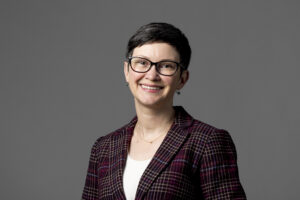
Fred C. Davison ECS Award: Kelly Hines, assistant professor in the Franklin College Department of Chemistry, is advancing bioanalytical chemistry through innovative applications of mass spectrometry. Her research integrates ion mobility-mass spectrometry (IM-MS) with multi-omics approaches to investigate antibiotic resistance at the molecular level. By developing high-throughput analytical techniques, Hines is uncovering how bacterial lipid composition influences resistance mechanisms, offering new insights for diagnostics and therapeutics. Her work has earned national recognition, including the American Society for Mass Spectrometry Research Award and designation as a Rising Star in Measurement Science by the American Chemical Society. She has published more than 35 peer-reviewed articles, secured a $2.3 million NIH R01 grant and contributed as a co-investigator on multiple projects. With ongoing research into host-pathogen lipid interactions and translational applications in clinical microbiology, Hines is poised to make lasting contributions to analytical chemistry and infectious disease research.

Fred C. Davison ECS Award: Matthew Bilskie, assistant professor in the College of Engineering, is advancing the field of coastal resilience through innovative modeling of storm surge, flood risk and nature-based infrastructure. As head of the college’s Coastal Ocean Analysis and Simulation Team and an affiliate of the Institute for Resilient Infrastructure Systems, he develops high-resolution hydrodynamic models that inform risk reduction strategies for vulnerable coastal communities. Bilskie’s research integrates engineering, computer science and natural resource economics, providing critical insights into how tidal dynamics, sea-level rise and climate change impact coastal flooding. His collaborations with the U.S. Marine Corps, the National Oceanic and Atmospheric Administration and the U.S. Army Corps of Engineers have led to real-world applications, including flood mitigation planning for military installations. With more than $32 million in research funding, 53 peer-reviewed publications and leadership in interdisciplinary resilience efforts, Bilskie is at the forefront of shaping coastal adaptation strategies. His work continues to influence both policy and engineering solutions for climate resilience.

Fred C. Davison ECS Award: Christopher Cleveland, assistant professor in the College of Veterinary Medicine’s population health department, is advancing wildlife disease research through a One Health approach that integrates ecology, epidemiology and parasitology. His work focuses on zoonotic parasite transmission, vectors and the surveillance of pathogens in wildlife. His research has provided critical insights into how environmental and wildlife factors contribute to the persistence of parasitic diseases, influencing both public health and conservation strategies. Cleveland has published 34 peer-reviewed articles since 2020, with 14 as first or corresponding author, and has secured more than $1.4 million in research funding as principal investigator. He has mentored numerous graduate, undergraduate and veterinary students, contributing to workforce development in wildlife health. A leader in his field, he has held presidential roles in professional societies, organized international research workshops and serves as associate editor for the Journal of Wildlife Diseases, positioning him for continued impact in wildlife disease ecology and global health.

Fred C. Davison ECS Award: Chester Joyner, assistant professor in the College of Veterinary Medicine’s infectious diseases department, is integrating molecular biology, immunology and vaccine development to develop new therapies needed to treat and prevent malaria. His work addresses some of the biggest challenges in the field by studying Plasmodium vivax dormancy in the liver, investigating why malaria infections fail to generate long-lived immune responses and leading the preclinical testing of an innovative vaccine strategy that counteracts the parasite’s ability to inhibit development of long-lived immunity. Through these studies, his lab has overcome one of malaria’s greatest challenges: the inability to genetically manipulate P. vivax in the lab, developing novel techniques to introduce genetic modifications into P. vivax and opening new avenues for biology and vaccinology. Joyner has secured more than $7.3 million in research funding, authored 30 peer-reviewed publications and been invited to share his work at major international conferences. His work is shaping the future of malaria treatment and eradication strategies.

Michael F. Adams ECS Award: Joseph Kellner, assistant professor in the Franklin College Department of History, is a historian of the Soviet Union whose research examines the intersection of ideology, belief and historical change. His forthcoming book, “The Spirit of Socialism: Culture and Belief at the Soviet Collapse” (Cornell University Press, June 2025), offers a groundbreaking analysis of the Soviet Union’s collapse, focused on a flourishing of new and radical worldviews that defined the period’s culture. Based on extensive oral history interviews, the book reappraises late Soviet culture and the Soviet legacy in post-Soviet Russia. Kellner is also co-editor of “Red Against Empire: Bolshevik Historians and the Anti-colonial Critique” (University of Toronto Press, expected 2026), which recovers and interprets early Soviet anti-colonial scholarship. A recipient of the Willson Center Research Fellowship and the Virginia Mary Macagnoni Prize for Innovative Research, Kellner is making significant contributions to scholarly debates on Soviet history, cultural identity and intellectual history.
International Collaborative Research Award

The Radioactive Wildlife Team, an international collaboration spanning the United States, Japan and Norway, is transforming scientific understanding of how nuclear accidents impact ecosystems. Working in Chernobyl, Fukushima and other radiologically contaminated landscapes, the team has challenged long-held assumptions about wildlife health in these environments, sparking global discussions on conservation and radiological risk assessment. James Beasley, Terrell Distinguished Professor of Wildlife Management in the Warnell School of Forestry and Natural Resources and the Savannah River Ecology Laboratory, has worked alongside colleagues Thomas Hinton (Fukushima University, Japan), Ole Christian Lind (Norwegian University of Life Sciences) and Kenji Nanba (Fukushima University, Japan) to develop GPS-dosimetry collars, a pioneering tool for tracking radiation exposure in free-ranging animals to improve wildlife health studies and risk assessments. Now deployed in Belarus, Japan, Norway, Sweden and the United States, their research has been recognized by the International Atomic Energy Agency and has influenced global radioecological studies, conservation strategies and public discourse.
Entrepreneur of the Year Award

Prashant Doshi, professor in the School of Computing, is transforming artificial intelligence research into real-world applications through his work on human-robot collaboration and inverse reinforcement learning. His research has broad implications across industries, including agriculture, where he is developing AI-driven collaborative robots (cobots) designed to streamline produce processing operations. To bring this technology to market, Doshi co-founded InversAI, a company focused on commercializing AI-powered automation. Under his leadership, the company secured grants from the Georgia Research Alliance and NSF Small Business Technology Transfer, funding the first application of AI-driven cobots in onion sorting and enabling onsite trials of the technology in Georgia’s onion processing sheds. By bridging academic research and industry, Doshi exemplifies the successful transition of university-based innovation into practical, scalable technologies. His work continues to push the boundaries of AI-driven robotics, shaping the future of intelligent automation and expanding its role in commercial and industrial settings.
Inventor of the Year Award

Kelly Dawe, Distinguished Research Professor and UGA Athletic Association Professor in the Franklin College departments of plant biology and genetics, has revolutionized maize breeding through a novel haploid induction system. His patented technology enables the efficient production of haploid maize plants — plants with a single set of chromosomes instead of the usual two — allowing breeders to develop pure, genetically stable crop lines in half the time of traditional methods. This innovation dramatically enhances the precision and speed of plant breeding, with significant implications for global agriculture. An international agricultural company licensed Dawe’s technology for worldwide use, integrating it into high-efficiency crop improvement programs. In collaboration with this company, Dawe and the UGA Research Foundation have filed 24 utility patent applications internationally, with one issued to date. Since the exclusive license agreement was signed in 2021, the technology has generated nearly $1.5 million in licensing revenue. Dawe’s work exemplifies the transformative impact of molecular genetics on commercial agriculture and food security.
Regents’ Entrepreneurs

Hitesh Handa, associate professor and Distinguished Faculty Fellow in the College of Engineering, is an innovator in biomedical device coatings, developing nitric oxide (NO)-based surfaces that prevent infection and thrombosis. His work has led to eight issued patents and 26 pending applications, with technologies exclusively licensed to Nytricx Inc., a company he co-founded. Nytricx is advancing NO-releasing medical devices, including vascular and urinary catheters and wound dressings. These innovations address hospital-acquired infections and implant failures, improving patient care and reducing health care costs. In the past two years, his ventures have secured more than $5 million in funding to accelerate commercialization. A Senior Member of the National Academy of Inventors, Handa is a key figure in Georgia’s growing biomedical sector, fostering industry partnerships, mentoring faculty entrepreneurs and bridging academic research with clinical application.

Ron Orlando, professor in the Complex Carbohydrate Research Center and the Franklin College departments of biochemistry and molecular biology and chemistry, has built a distinguished career translating glycobiology and proteomics research into commercial innovation. He has founded three companies — BioInquire, GlycoScientific and PhotoChem/GenNext Technologies — all based on technologies developed at UGA, securing more than $17 million in funding to support their growth. His company BioInquire developed ProteoIQ, a leading software tool for proteomics data analysis, which was later acquired by NuSep for $3.6 million, helping relocate the company’s North American headquarters to Athens. GlycoScientific, specializing in novel research reagents, has produced more than 100 products, while PhotoChem/GenNext has launched two biopharmaceutical analytical devices. A Senior Member of the National Academy of Inventors, Orlando continues to bridge academic research and industry, developing technologies that advance applications of glycoscience and biopharmaceutical analytics.
Research Communications Award

Jenna Jambeck, Georgia Athletic Association Distinguished Professor of Environmental Engineering in the College of Engineering, is a globally recognized researcher and communicator specializing in plastic pollution and materials management. Her unique ability to blend scientific rigor with effective communication has elevated public understanding and policy action on environmental sustainability worldwide. Jambeck’s groundbreaking studies, including the 2015 revelation that 8 million metric tons of plastic waste enter the Earth’s oceans annually, have been extensively covered by major outlets such as NPR, BBC, The New York Times and National Geographic. Her publications have been cited over 37,000 times, ranking among the top in their fields, and her work has been instrumental in United Nations treaty negotiations, global policy workshops and the creation of circular economy frameworks through her Circularity Assessment Protocol. As the creator of the Marine Debris Tracker app, Jambeck has facilitated global citizen science efforts, leading to extensive data collection in 100 countries. In 2022, Jambeck was awarded a coveted “Genius Grant” from the John D. and Catherine T. MacArthur Foundation, and she was named the 2024 SEC Professor of the Year.
Non-Tenure Track Faculty Research Excellence Awards

Scott Pippin, senior public service associate in the Carl Vinson Institute of Government, is a leader in applied research on community resilience, environmental policy and infrastructure planning. He founded the Defense Community Resilience Program, a multidisciplinary initiative that strengthens military installations and surrounding communities through data-driven planning and policy strategies. His work has secured more than $7.6 million in funded projects and has been instrumental in developing two 10-year Intergovernmental Support Agreements with the U.S. Army, totaling more than $100 million in authorized funding. Pippin’s applied research has shaped policies on transportation networks, wastewater infrastructure and flood resilience, influencing federal and state decision-making. His peer-reviewed publications, law review articles and national presentations have earned recognition from the National Academy of Sciences and the U.S. Department of Defense. A recipient of the Walter Barnard Hill Award for Distinguished Achievement in Public Service and Outreach, Pippin continues to advance impactful solutions for resilient communities.
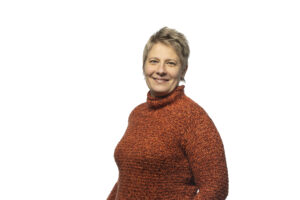
Jennifer Thompson, associate research scientist in the College of Agricultural and Environmental Sciences, is a leader in research on the social sustainability of agriculture and food systems. Her interdisciplinary and community-engaged scholarship advances knowledge and practice on the human dimensions of climate-smart agriculture, community food systems and food systems education. Over her career, Thompson has secured funding on projects totaling over $105 million, including $7.5 million to UGA and over $3 million directly supporting her lab. As the lead social scientist on major USDA-funded sustainable agricultural projects, Thompson’s commitment to farmer engagement is producing unique insights that inform policy and outreach. An internationally recognized scholar, she has conducted research in France, Norway, Spain and across the United States, publishing in top-tier journals. As a research mentor and past president of the Society for the Anthropology of Food and Nutrition, Thompson fosters the future of sustainable agriculture and food systems scholarship.
Team Impact Award
Established by the UGA Research Foundation, these awards recognize junior faculty whose research, creative and scholarly achievements indicate a trajectory toward an exceptional, sustained research career and an imminent rise to international stature in their field of study.
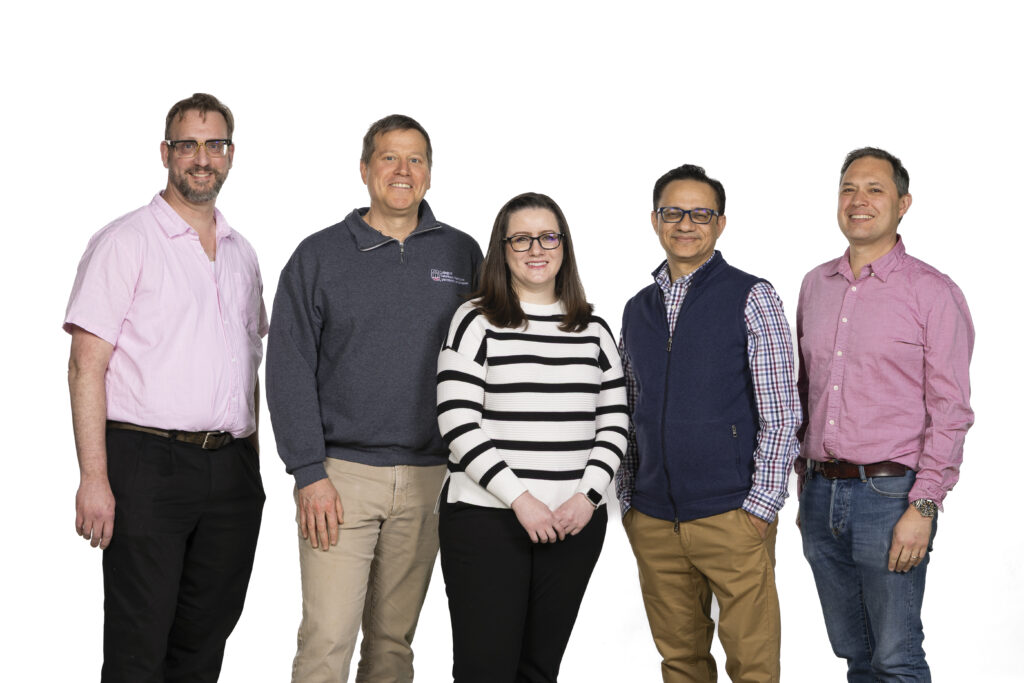
The Biointerface Translation and Engineering Center (BTEC), an interdisciplinary research initiative spanning the College of Engineering, Franklin College of Arts and Sciences and the College of Veterinary Medicine, is at the forefront of transforming biomedical research through innovation in advanced biomaterials for medical devices. Addressing critical clinical challenges such as thrombosis, infection and antimicrobial resistance, BTEC’s work spans a range of applications including vascular catheters, wound dressings, implantable sensors and extracorporeal life-support systems. The team has secured more than $12 million in competitive federal research grants, and their collaborative efforts have resulted in more than 35 patent filings, numerous high-impact publications and significant mentorship of students across multiple disciplines. By integrating materials science, microbiology and clinical research, BTEC is pioneering next-generation medical technologies poised to enhance patient outcomes globally.


